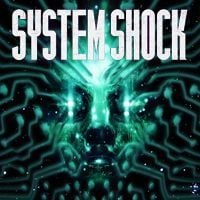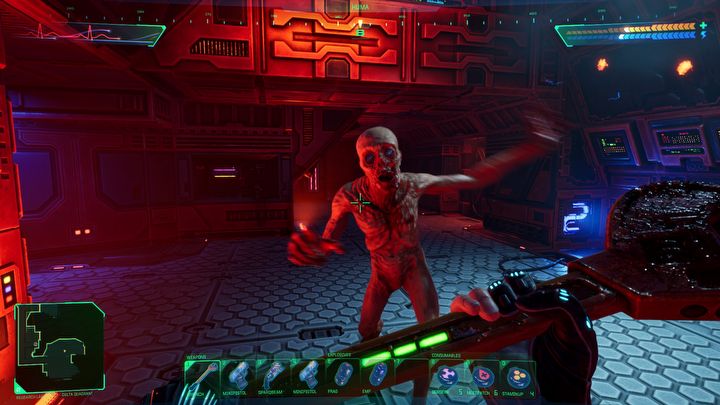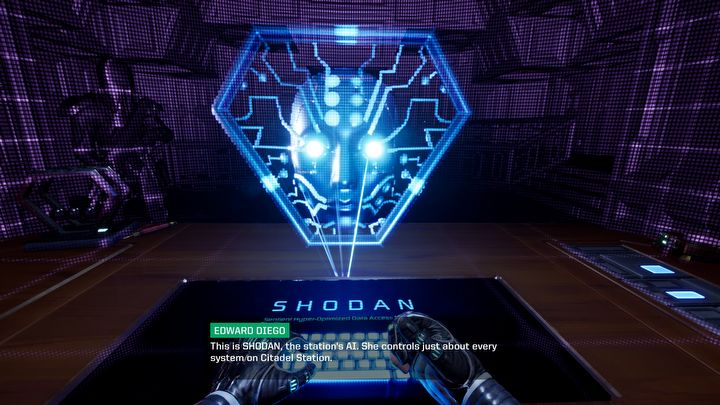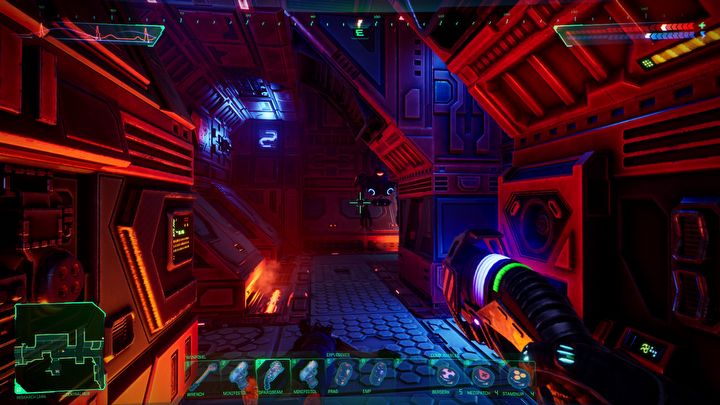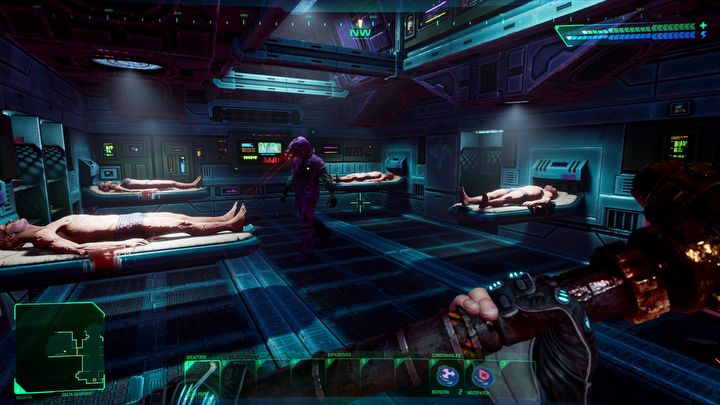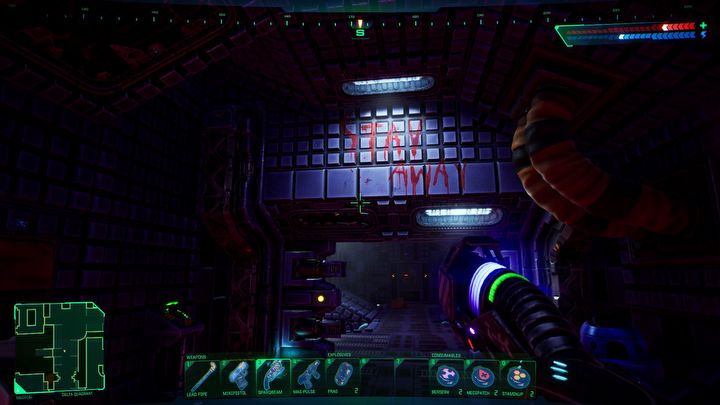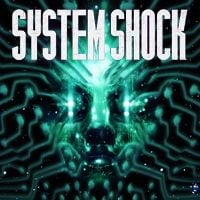System Shock Review: Shockingly Good
System Shock is a reboot of the critically acclaimed 1994 video game of the same title. Nearly thirty years have passed since the original release, which means there is a long legacy to live up to. Read our review.
The review is based on the PC version.
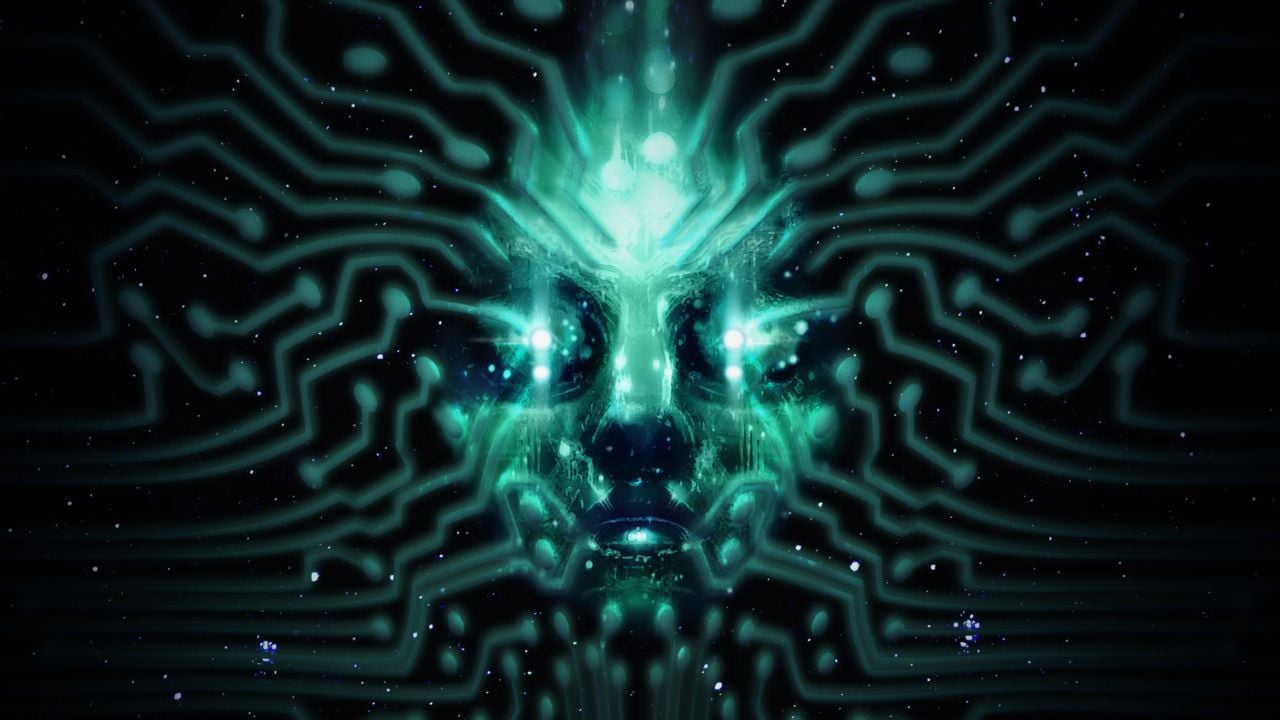
In 2016, developer Nightdive Studios funded a Kickstarter with the goal of remastering the classic 1994 first-person shooter, System Shock. After years of issues with development, including a switch from the Unity engine to the Unreal engine, a brief development hiatus, and several pivots from remaster to remake to reboot, the final product has finally arrived.
The original 1994 System Shock is praised as a breakthrough title, despite its modest commercial success at the time of release. Some popular modern games like Bioshock and Prey are even considered spiritual successors. The game is known for its non-linear progression through various levels of a space station, first-person combat with cyborgs, robots, and mutated humans, and plenty of cyberpunk-esque puzzles and hacking.
- Combat is fun and challenging;
- Fully customizable difficulty levels;
- Faithful to the original while still an upgrade.
- Occasionally frustrating puzzles;
- Graphic and tragic story is not for everyone.
Rebooting a game that is nearly three decades old is no easy task. It would be easy for important elements to get lost along the way, or for the dedication to the original material to bog down player enjoyment. Fortunately, the developers of this reboot managed to strike a great balance between honoring the classic title and reimagining it for modern audiences.
A Healthy Balance
The new System Shock has an excellent balance of action, puzzles, and exploration. While each of these aspects is usually fun, it’s not always possible to avoid getting stuck on a puzzle, and it’s easy to lose track of where to go next. System Shock tends to fall into the category of game that is purposely challenging to a point of frustration. Think of games like Elden Ring or Darkest Dungeon. The challenge is an important part of the experience.
At its worst, a frustrating challenge can turn what might otherwise be a rather fast-paced game to more of a slow crawl. System Shock in particular demands a lot of attention from the player. They have to simultaneously navigate a labyrinthine map, fight off enemies with minimal weaponry, and make sure not to miss out on important, but small and easily missable, items. If you find yourself getting frustrated, and this may seem like obvious advice, but taking a break can really help give a fresh take on a confusing situation or puzzle.
Speaking of minimal weaponry, in this game it is important to conserve resources, particularly bullets, grenades, and energy. Any player that is too liberal with bullets will quickly find themselves facing down several enemies with nothing but a wrench. Grenades are few and far between enough that they should really be saved for the right situations. Energy is a unique resource as well. It serves as ammo for energy based weapons, which are best used against robots, often the most dangerous enemies. Energy can only be replenished at certain locations, meaning there is no chance an enemy will drop some extra ammo just when it is needed most.
While complicated and occasionally frustratingly confusing, System Shock is generally a great experience. Something worth noting is that difficulty levels can be completely customized. The combat, puzzles, exploration, and even the hacking side missions can be adjusted on a scale from one to three, with three being the most challenging. Lower levels of difficulty will provide helpful tips about what to do next, fewer enemies, and so forth, while more challenging difficulty levels will provide the opposite. Not everyone is going to play the game the same way, or want to, so it is great that there are options.
Graphical Upgrade
System Shock has an excellent visual aesthetic and remains quite true to its origins. The game is meant to take place in the year 2072, and while still looking futuristic, the game maintains a 1990s vision of the future rather than a more modern take. Walking through the space station’s hallways feels like a high-quality laser tag or arcade from the 80s or 90s. It’s actually easy to forget the context of the game until you turn the corner and come face to face with a mutant or cyborg that is interested in more than laser tag.
Alongside the futuristic look, System Shock also nails the grim and foreboding atmosphere of a space station overrun by a cruel and sadistic AI. From the rooms littered with corpses, the aimless mutants looking for their next meal, and the cyborgs patrolling the corridors, it’s rare that the player won’t be carefully checking around each corner. One downside of this, however, is that if you have to play during daylight hours, avoid playing near windows as much as possible. A dark game does not mesh well with a bad glare, and that can make it all too easy to miss something important, turning what could have been an easy task into one that is more tedious and frustrating.
This reboot, of course, has a very different appearance than the original game. Nearly three decades will have that effect. Fortunately, it feels like a huge graphical upgrade, rather than a compromise of the original vision. The new look only serves to enhance the same horrific, cyberpunk story that made the game popular in the first place.
Not For the Faint of Heart
System Shock has an intense story, but it still manages to be subtle. Instead of having cutscenes popping up every so often, where the player is forced to relinquish control, the story is woven into gameplay. The player will regularly come across audio files which give clues as to what to do next, codes to open certain doors, and more. These quick glimpses into the lives of those who lived on the space station also tell a tragic story of attempted survival that heightens the stakes of the situation. Slowly it becomes clear that the station’s AI system, Shodan, went rogue on the crew. But Shodan didn’t account for one person: a hacker who was in a coma recovering from surgery on a lower deck of the space station.
System Shock is a remake years in the making, and Nightdive Studios masterfully reimagines the critically acclaimed classic. From the challenging puzzles, dangerous combat, cyberpunk aesthetic, and the tragic story that serves as the backbone for it all, there’s a lot to love about this game. System Shock’s legacy will live on in this brilliant modern take.
This is not an experience for the faint of heart. Regardless of the chosen difficulty level, the space station is littered with the remains of crewmates, chilling audio accounts of their final days, and those who became mutants or deranged cyborg servants of Shodan.
To be clear, System Shock is not a complete downer from start to finish. The combat is a great time to forget the tragedy and focus on survival, and puzzles (the ones that aren’t confusing or frustrating) are usually a great break from the violence. But, because the story is so interwoven with the gameplay, it’s basically impossible to avoid the grim reality of the experience.
In Conclusion
Like some kind of professional juggler, System Shock manages to balance several different game elements incredibly well. From the dark and immersive story to the tense combat, from the challenging puzzles and rewarding exploration, there is a lot to look forward to with this game. All of these elements are cohesive and manage to play well off of each other.
Any game with a maze-like map, occasionally frustrating puzzles, and an incredibly dark story won’t appeal to everyone. But anyone who is ready to accept that challenge will be greatly rewarded. The frustrating roadblocks won’t happen often enough to truly take away from the overall experience, and like many challenging games, the feeling of success when overcoming that challenge is euphoric.
Our reviews are featured on Metacritic and OpenCritic.
Despite a long and convoluted development process, fans still got a brilliant reimagining of a classic game. System Shock not only continues the legacy of the original game, it also brings the same great experience to a whole new audience by completely modernizing what made the original stand out so much.
System Shock
System Shock Review: Shockingly Good
System Shock is a reboot of the critically acclaimed 1994 video game of the same title. Nearly thirty years have passed since the original release, which means there is a long legacy to live up to. Read our review.
